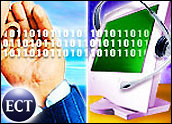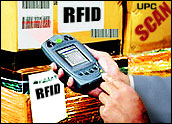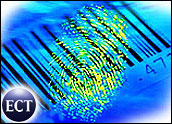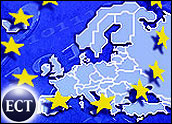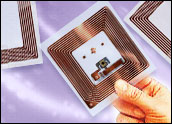
The wireless industry is mounting a very public defense for a controversial application of “contactless smart cards” while a number of consumer groups and privacy advocates have decried the technology as potentially invasive of personal privacy.
Former Secretary of the Department of Homeland Security Tom Ridge said at a conference in Chicago this month that Radio Frequency Identification (RFID) technology for passports and similar contactless smart cards for IDs “will make us safer” by helping security personnel verify a traveler’s or visitor’s identity.
Ridge, now on the board of directors of RFID maker and DHS contractor Savi Technology, told audience members at the RFID Journal Live conference that government tests to use RFID and smart-card technology to identify passengers and cargo at airports were a “success” and that the Feds will safeguard the data gathered.
Name Games
The government is now moving forward with plans to insert RFID-like chips into all new American passports beginning later this year, and, perhaps even sooner, into government employee ID cards as well. The cards, which will have a flash memory similar to that of a PDA, will include the traveler’s name, date of birth, city of origin and other identifying information, like a digital picture or digital fingerprints.
The Department of State is not calling the passports RFID-enabled; rather, it calls them “contactless smart-cards.” Leading privacy rights groups like the Electronic Frontier Foundation (EFF), the American Civil Liberties Union (ACLU) and some conservative religious groups are speaking out against the technology.
“The DHS is playing a name game in response to the incessant noise of the privacy advocates, banging on pots and pans,” said Robert Siciliano, a personal security and identity theft expert, who authored “The Safety Minute: 0:01.”
“The DHS is playing the name game partly because a religious group, Resistance for Christ, is calling for a boycott of radio frequency identification systems. Evoking the revelations of the Apostle John, Resistance for Christ warns that RFID tags may be the precursor to the universal identification known in biblical prophecy as ‘The Mark of the Beast.'”
The positions of the religious group have been reported online by Agape Press. Agape is the Biblical Greek word for “love.”
Electronic Pickpockets?
Other critics are concerned that the contactless smart-cards and RFID technologies used in ID cards could make it easy for ID thieves to target travelers. They believe that ID thieves will outfit themselves with portable scanners and electronically pick the pockets of those they target.
Siciliano reckons that the privacy and religious groups opposing the cards are in grievous error. “The battle at hand is properly identifying who’s who,” he said.
The contactless smart cards contain a digital signature algorithm — a complex mathematical formula — that makes it difficult to counterfeit other cards using the data from the original card. Some security experts have said that the digital signature affords integrity to the data.
Passive Tech
This technology is passive — meaning the cards don’t have a power source in them. All the power comes from the induction of the magnetic field generated by the device that reads the chips.
International travelers will present their passport to the border agent at customs, who will simply run them over a card reader, in the same way that a checkout clerk runs an item over a scanner at the supermarket.
Major manufacturers like Philips Semiconductors, On Track Innovations, Ltd. and others are involved in the field. “The primary driver of RFID has been mainstream products,” said Manuel Albers, director of business development, Philips Semiconductors.
Philips believes there is a lot of confusion over the differences between RFID chips and the smart cards. But critics believe that the technologies are essentially the same, and are concerned, they say, about potential misuses of the technology, including ID theft.
New ID Cards
The Department of Homeland Security is planning to issue the contactless smart-cards to its employees in the form of new identification cards. The new cards, which will include digital images of fingerprints, will be used to increase the efficiency of DHS workers. The DHS workers are being issued the ID cards as part of a directive signed by President Bush.
The cards can come in several varieties, according to a spokesman for TopCoder, Inc., including read-only, read-write and digital signal transponder. The most advanced cards are the digital signal transponders. The interactive read-write programming of the card provides a significant advantage for security personnel tracking and restricted access applications, like airplane cockpits.
The card readers have a very limited range — 100 centimeters. There have been test cases of the efficiency of the readers in the field. The government of Israel is a major proponent of the technology, and has hired On Track Innovations, a developer of contactless tags, as a prime contractor.
Customs agents and other security personnel will continue to look at the picture of a person on their passport, or ID, and compare it to the person presenting the travel document, as a failsafe measure. But the controversy over the technology in these applications — as contrasted with the use of RFID in logistics and retailing — will continue. “DHS avoids the term ‘RF’ [radio frequency] like the plague,” said Siciliano.


